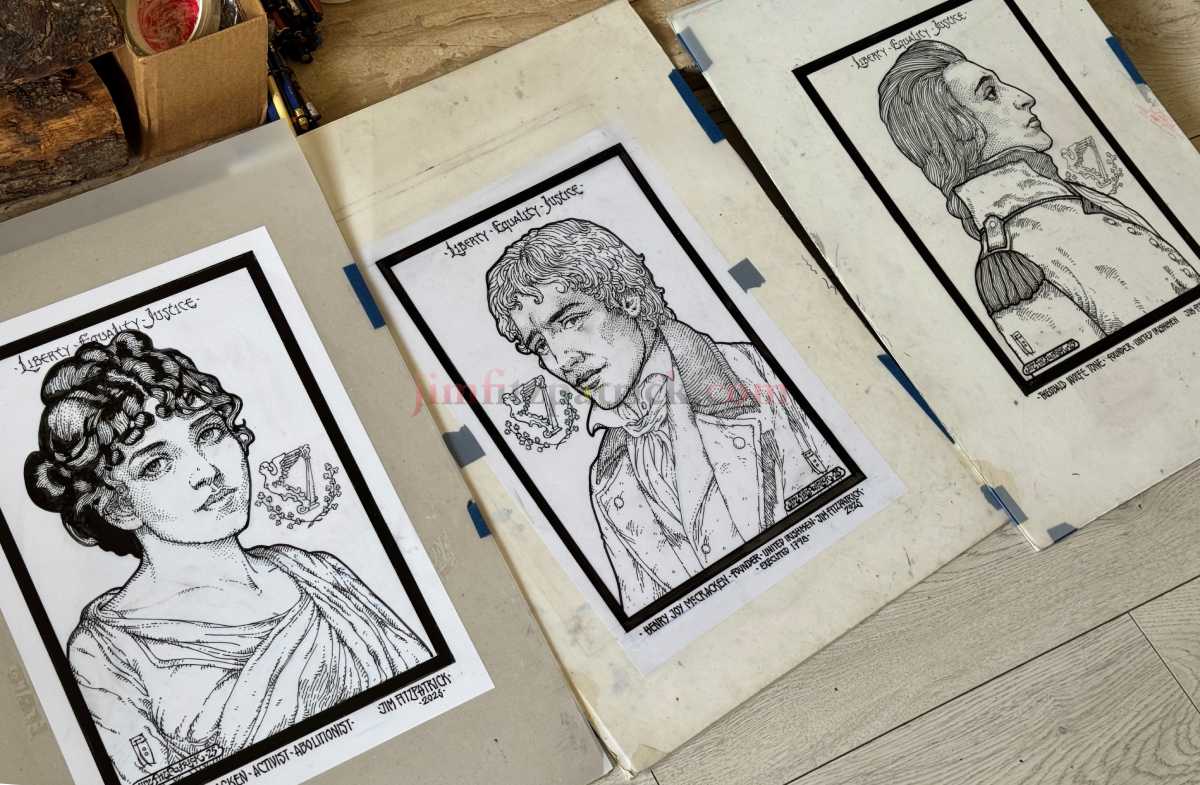
Art and History as Therapy
Every morning I awake to this barbaric Gaza Genocide. How does any artist keep sane? How do we respond?
Maybe by re-exploring our own Irish past and the many attempts to eradicate our own Irish race from the face of the earth. It might help and be instructive. Might help quell the rage.
After all, they failed to kill us Irish off, just as they will fail to exterminate all Palestine and its diverse Jewish, Muslim, and Christian peoples.
This slaughter and genocide is not unfamiliar if you are Irish. So far, from the attempted extermination of the ‘Wild Irish’ race in the 1700s when the British offered five pounds for the head of a wild ‘Taig’ or a wild wolf, we Irish have been the subject of at least three attempted genocides by our esteemed British neighbours.
Our History is the Voice that Guides Us
Let us skip over that for the moment and try to forget these modern and latter-day genocides and focus on the heroes who stood firm against overwhelming odds to try to strike out for Irish freedom and independence.
All my life I have been fascinated with the abortive rebellion of 1798 and the horrific consequences as the entire Irish population was subjected to hideous public executions and beheadings, and of course those well-known, well-documented, horrible and cruel ‘half-hangings ‘and brutal Yeoman pitchcapping.

So far, I have finished a few drawings and one painting on this sensitive subject, now airbrushed and varnished from our history. The finished artwork is one of my youthful Irish rebel heroes, Wexford rebel leader Captain John Kelly, ‘The Boy From Killanne’.
Three Rebel Heroes
The other three 1798 rebels are the greatest of them all, in my opinion, Wolfe Tone, Henry Joy McCracken, and Mary Ann McCracken. I would love to record the likes of the Sheares brothers, executed together, holding hands, and the crazy and extraordinary Napper Tandy, who befriended Napoleon and sat on the podium with him for the review of his ‘Grand Armée’.
I have completed the drawing stage for the three below:
1. Wolfe Tone, now regarded as one of our greatest Irish heroes, who worked with the French revolutionary army in a failed invasion to liberate Ireland and paid for it with his life.
He was, I believed, suicided, to silence any potential court proclamations about Irish freedom.

2. Henry Joy McCracken, who founded the United Irishmen with Tone and others, was executed after the 1798 rising and spared beheading thanks to his sister, Mary Ann, who pleaded with General Munro, the British commander of Ulster, and as a result, he left the body intact.

3. Mary Ann McCracken, who went from being a supporter and ally of so many ’98 men on the run, like her close friend Thomas Russell, the ‘Man from God Knows Where’, to a vocal proponent of womens rights.
‘Moreover, influenced probably by Mary Wollstonecraft’s Vindication of the rights of woman, she argued that the liberty and equality for which the United Irishmen were campaigning should be extended to women: ‘. . . is it not almost the time for the clouds of error and prejudice to disperse and that the female part of the creation as well as the male should throw off the fetters with which they have been so long mentally bound and conscious of the dignity and importance of their nature rise to the situation for which they were designed . . .’ (Madden papers, 151).
Later, Mary Ann became a hardcore and powerful anti-slavery abolitionist.
On a personal level, what is most extraordinary to me was to discover that this amazing woman lived to the age of 96, long enough to be photographed.
That was some life.

Our History in Poetry
The great poet Seamus Heaney said it best, remembering the men of ‘98.
Requiem for the Croppies: by Seamus Heaney
The pockets of our greatcoats full of barley…
No kitchens on the run, no striking camp…
We moved quick and sudden in our own country.
The priest lay behind ditches with the tramp.
A people hardly marching… on the hike…
We found new tactics happening each day:
We’d cut through reins and rider with the pike
And stampede cattle into infantry,
Then retreat through hedges where cavalry must be thrown.
Until… on Vinegar Hill… the final conclave.
Terraced thousands died, shaking scythes at cannon.
The hillside blushed, soaked in our broken wave.
They buried us without shroud or coffin
And in August… the barley grew up out of our grave.

